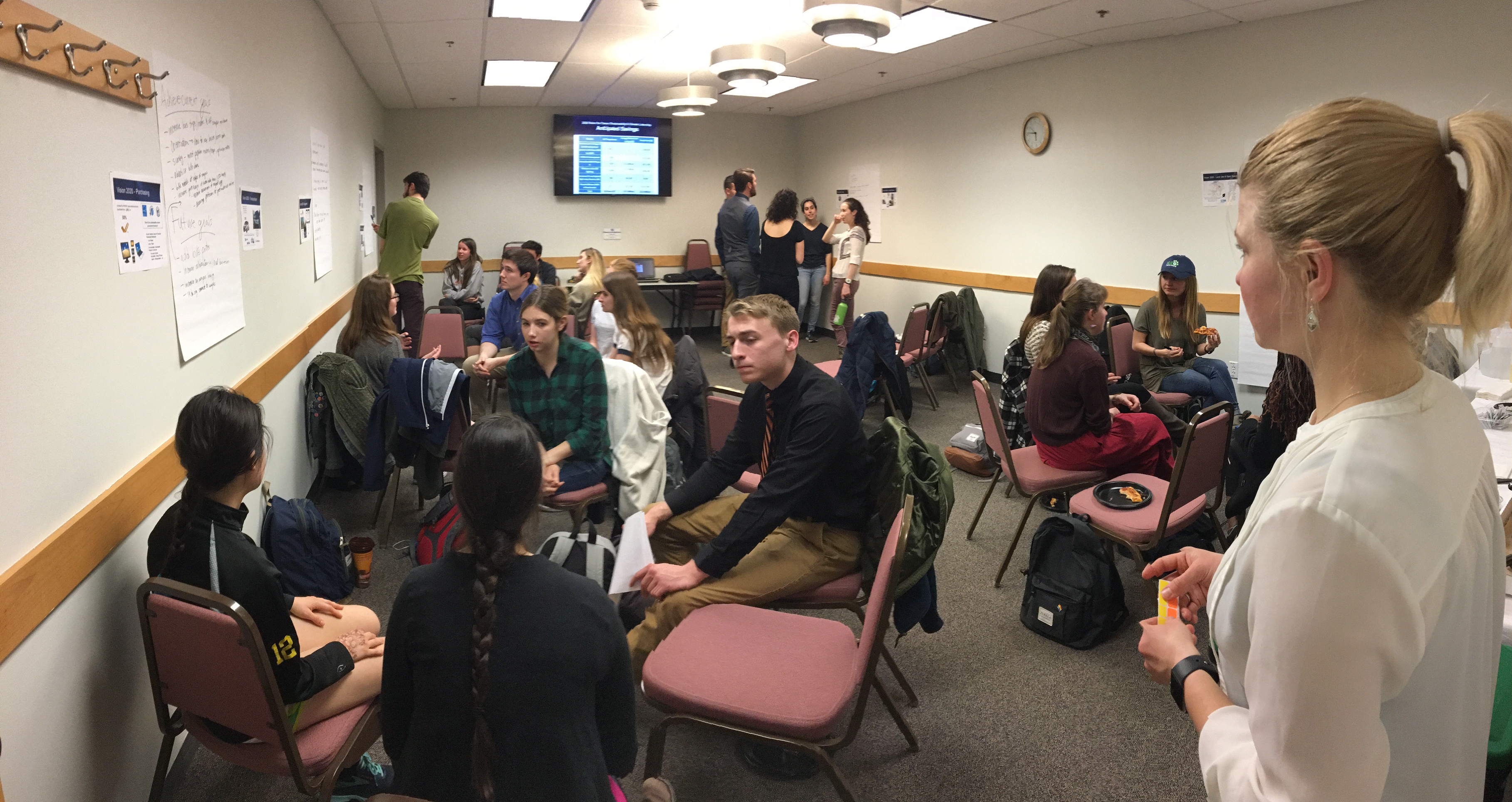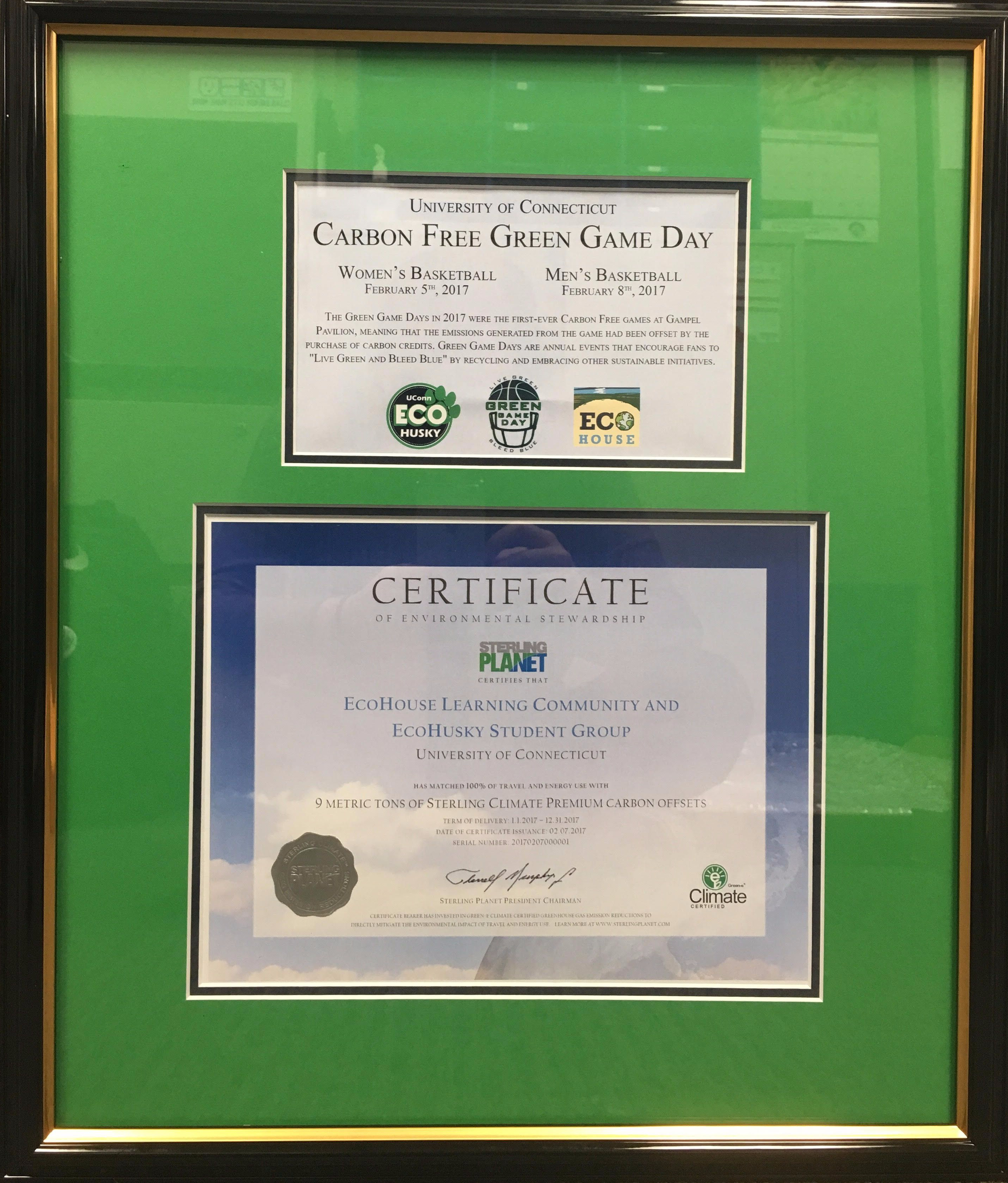On Wednesday February 22nd, the Office of Environmental Policy (OEP) hosted the 2020 Vision Student Summit, with the goal of obtaining student opinions on the UConn administration’s new plans to increase campus sustainability. Approximately 25 to 30 students attended and deliberated over how we can meet the Vision’s goals, as well as even more ambitious goals we can set for the future. In groups of 3-4, students discussed initiatives for topics ranging from transportation and purchasing to energy to food and waste management. During each group session, OEP interns recorded ideas for achieving our goals and setting new ones. Students then voted on which ideas seemed most plausible and impactful. Here are some pertinent reflections on the event written by student attendees:

“The specific goals of the 2020 Vision Plan appeared ambitious at first glance, and I was somewhat skeptical going into the meeting. Attending the summit and hearing that some of the goals set have already essentially been reached, however, such as the plan to reduce potable water consumption by 30% (UConn is currently at 29% if I recall correctly), altered that feeling dramatically. I’m far more optimistic about the eventual achievement of these goals, and excited for them to come to fruition.” – Sophie Macdonald
“From transportation to purchasing, dining to water, the school has people working in every possible way. Not only that, even though considerable strides have already been made towards a more sustainable campus, the dedication to the cause never waivers and there are always new objectives in sight.” – Emma Belliveau
“My favorite part was when I was in a small group with 2 other people and 2 interns and we were posed with the challenge of figuring out how to maintain the HEEP on campus. I felt very passionate about this because of all my personal experiences maintaining outdoor areas like parks and wooded fields, and doing trail work.” – Kelly Finn

“The… section that stood out to me was the outreach and engagement section. One of the goals under this section is to formalize UCONN@COP as “a co-curricular, experiential learning and leadership development program…” I personally love this initiative because after attending the Climate Café, I realized what a great opportunity this trip would be. There is no better way for students to learn about climate change than to attend the global conference dedicated to the issue, and UCONN should recognize the program for the opportunity that it is.” – Matthew McKenna
“At the UConn 2020 Vision Plan Student Summit, it became clear to me that at UConn, sustainability is not just a buzzword or a label the university uses to pat itself on the back. Rather, sustainability is a mode of operation and a system of values that governs policymaking and is upheld by an interdisciplinary team of passionate students and professional leaders.” – Weston Henry
“What the 2020 Summit did for me was to give me a more comprehensive understanding of the efforts that UConn undertakes, past, present, and future. It helped me to understand why UConn undertakes certain efforts, why it doesn’t take up others, and how the work of the OEP and its staff is able to shape UConn every single day.” – Colin Mortimer
“I was absolutely blown away by the sense of creativity and motivation that I felt while we were all discussing the different ideas for UConn’s 2020 Vision. I deeply enjoyed the presentation by Director Richard Miller because he gave many fascinating details that I was not aware of beforehand. I am certainly proud of our university for ranking in the top ten on two separate sustainability indexes.” – Joshua Tellier




 Every spring, volunteers from the EcoHusky student group and EcoHouse learning community come together to raise environmental awareness at Basketball Green Game Days. By teaching fans how to recycle, and collecting bottles at the end of the game, volunteers always play an integral role in making these events “green.” This year’s Green Game Days were special because, for the very first time, the Office of Environmental Policy purchased carbon offsets to make the games carbon-free!
Every spring, volunteers from the EcoHusky student group and EcoHouse learning community come together to raise environmental awareness at Basketball Green Game Days. By teaching fans how to recycle, and collecting bottles at the end of the game, volunteers always play an integral role in making these events “green.” This year’s Green Game Days were special because, for the very first time, the Office of Environmental Policy purchased carbon offsets to make the games carbon-free! We would like to thank all of our volunteers for their time and enthusiasm. With their help, we were able to collect enough bottles to donate $40 to the Campus Sustainability Fund to support more programs and initiatives to raise environmental awareness. We would also like to thank UConn Athletics for their time and effort to promote sustainability. We greatly appreciate the P.A. announcements, video board slides, and social media posts throughout the events. We look forward to working with you at future Green Game Days!
We would like to thank all of our volunteers for their time and enthusiasm. With their help, we were able to collect enough bottles to donate $40 to the Campus Sustainability Fund to support more programs and initiatives to raise environmental awareness. We would also like to thank UConn Athletics for their time and effort to promote sustainability. We greatly appreciate the P.A. announcements, video board slides, and social media posts throughout the events. We look forward to working with you at future Green Game Days! B charging port.
B charging port.



